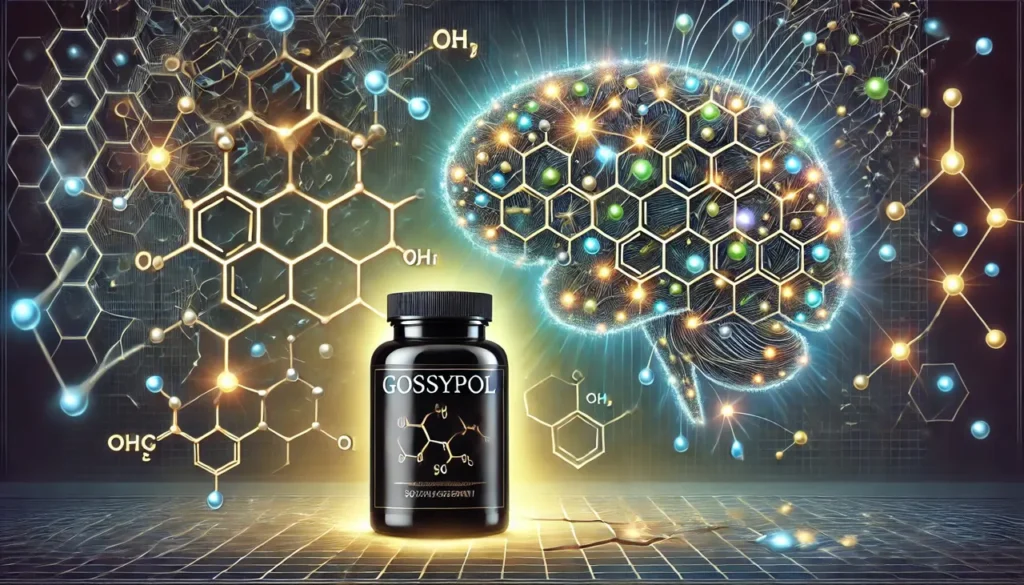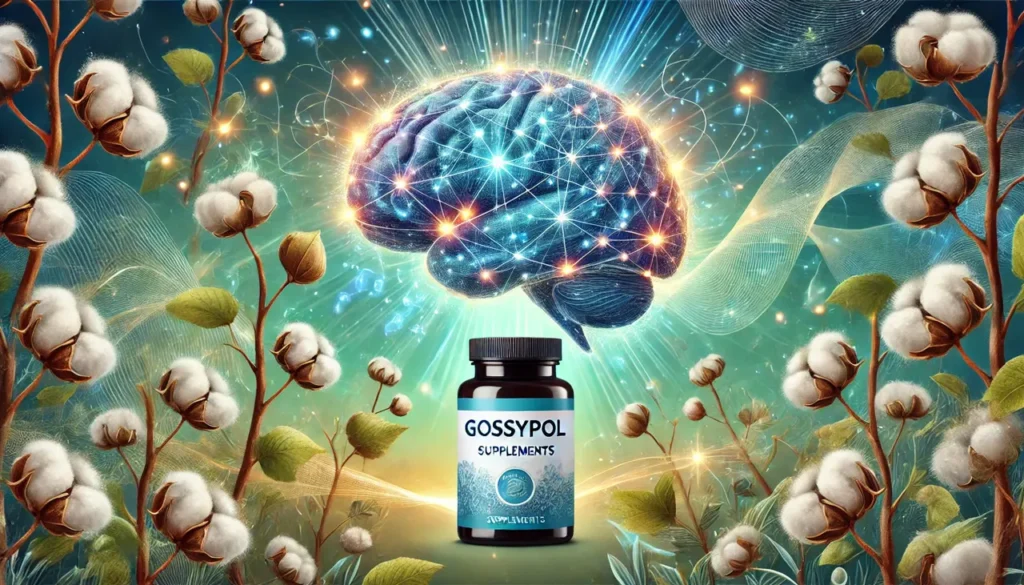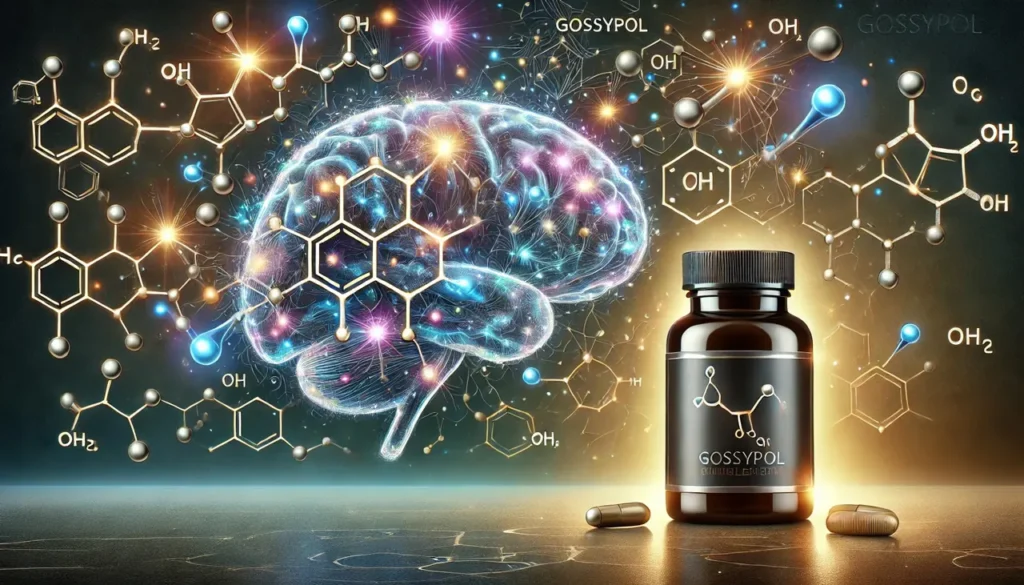Gossypol is a naturally occurring polyphenolic compound derived primarily from the seeds and leaves of the cotton plant (Gossypium species). It has been studied for various pharmacological effects, including anti-inflammatory, anti-tumor, and anti-fertility properties. More recently, researchers have begun exploring gossypol’s potential nootropic benefits, particularly regarding cognitive enhancement and overall brain health. This article delves into the chemistry of gossypol, its physiological mechanisms of action, potential nootropic benefits, dosing guidelines, side effects, drug interactions, and essential considerations for safe supplementation.
You May Also Like:
Sources of Gossypol
Gossypol is predominantly extracted from cotton plants, particularly from the seeds and leaves. The compound is known to be present in varying concentrations, influenced by the cotton species, growth conditions, and extraction methods. It is commonly available in the form of:
- Powdered extracts: Ground cotton seed or gossypol extracts are utilized in supplements and research.
- Capsules and tablets: Standardized gossypol supplements are available in pill form for easy dosage.
- Tinctures and liquid extracts: These are often concentrated forms used in traditional medicine.
Due to the toxic nature of gossypol at high doses, sourcing it from reputable suppliers is crucial to ensure quality, potency, and safety. Adulteration and mislabeling can pose significant risks to consumers, emphasizing the importance of transparency in supplement labeling.

Chemistry of Gossypol
Chemically, gossypol is a dibenzylbutyrolactone derivative, exhibiting a complex structure that allows for its multiple biological activities. The compound consists of two linked aromatic rings and a butyrolactone moiety. Its molecular formula is C30H30O8, with a molecular weight of 530.55 g/mol. The structural characteristics of gossypol allow it to interact with various cellular targets, particularly those involved in signaling pathways and oxidative stress response.
Gossypol has demonstrated the ability to chelate metal ions, including iron and copper, which may contribute to its antioxidant effects. This metal-chelating property can inhibit the formation of reactive oxygen species (ROS), potentially reducing oxidative damage to cells, including neurons. Furthermore, gossypol exhibits a significant binding affinity for various receptors and enzymes involved in cellular signaling, highlighting its multifaceted biochemical interactions.

Physiological Mechanisms of Gossypol in the Body and Brain
The physiological effects of gossypol are attributed to several mechanisms of action, particularly its interactions with neurotransmitter systems, antioxidant activity, and modulation of cellular signaling pathways.
Neurotransmitter Modulation
Gossypol has been shown to influence neurotransmitter systems, particularly the dopaminergic and serotonergic pathways. Research indicates that gossypol can inhibit the enzyme monoamine oxidase (MAO), which is responsible for the degradation of neurotransmitters such as dopamine, norepinephrine, and serotonin. By inhibiting MAO, gossypol may increase the availability of these neurotransmitters, potentially enhancing mood and cognitive function. This modulation could explain its potential use as a nootropic supplement, particularly in conditions associated with mood disorders.
Antioxidant Activity
Gossypol’s antioxidant properties are crucial for protecting neural tissues from oxidative stress. Oxidative stress is a significant factor in neurodegenerative diseases and cognitive decline. By reducing ROS levels, gossypol may help protect neurons from damage and support overall brain health. Studies suggest that gossypol’s ability to scavenge free radicals and chelate transition metals contributes to its neuroprotective effects.
Anti-Inflammatory Properties
Chronic inflammation is another contributor to cognitive decline and neurodegeneration. Gossypol has demonstrated potential anti-inflammatory effects by inhibiting the production of pro-inflammatory cytokines and modulating signaling pathways involved in inflammation, such as nuclear factor kappa B (NF-kB). This modulation of the inflammatory response may further enhance gossypol’s potential as a nootropic supplement, promoting a healthier environment for neuronal function.
Transform Your Wellbeing with Amazon’s Best Multivitamins for Brain and Body Support—Find Out More!

Nootropic Benefits of Gossypol
The emerging interest in gossypol as a nootropic stems from its biochemical activities that may enhance cognitive performance. While research on gossypol’s nootropic effects is still in its early stages, preliminary findings suggest promising potential in several key areas:
- Cognitive Enhancement: Preliminary studies suggest that gossypol may improve cognitive functions, such as memory and learning. By increasing neurotransmitter availability, particularly dopamine and serotonin, gossypol may enhance synaptic plasticity, which is essential for learning and memory formation. Additionally, its ability to promote neurogenesis—the growth of new neurons—could further contribute to improved cognitive capabilities, especially in aging individuals. This regenerative potential positions gossypol as a promising candidate for research into therapies for age-related cognitive decline.
- Mood Improvement: Gossypol’s impact on the dopaminergic and serotonergic systems may provide benefits for mood regulation. Improved mood can enhance cognitive performance, particularly in tasks requiring sustained attention and focus. Studies indicate that by increasing serotonin levels, gossypol may help alleviate symptoms of anxiety and depression, making it a potential adjunct therapy for individuals with mood disorders. This mood-enhancing effect could also lead to increased motivation and productivity in both personal and professional settings.
- Neuroprotection: The antioxidant and anti-inflammatory properties of gossypol may protect against neurodegenerative diseases and cognitive decline. By mitigating oxidative stress and inflammation, gossypol could support long-term cognitive health, particularly in aging populations. Furthermore, its ability to cross the blood-brain barrier allows it to exert protective effects directly within the brain, potentially reducing the risk of conditions such as Alzheimer’s and Parkinson’s disease. This neuroprotective capacity underscores the importance of gossypol in maintaining brain health as we age.
- Stress Resilience: Some studies indicate that gossypol may enhance resilience to stress by modulating stress-related neurotransmitter systems. Improved stress management contributes to better cognitive performance, especially under challenging conditions. By stabilizing mood and reducing anxiety, gossypol may help individuals cope with stress more effectively, leading to improved focus and decision-making during high-pressure situations. This resilience can be particularly beneficial in academic or work environments where cognitive demands are high and stress levels are elevated.

Dosage and Supplementation Guidelines
The appropriate dosage of gossypol for nootropic purposes is not well established due to limited research on its cognitive effects. However, based on available studies and traditional use, the following dosage guidelines may be considered:
- General Dosage: Preliminary recommendations suggest that doses ranging from 50 to 200 mg of gossypol per day may be effective for cognitive enhancement. However, due to its toxicity at high levels, it is crucial to start with lower doses and assess individual tolerance.
- Supplement Forms: Gossypol is available in various forms, including capsules, tablets, and extracts. It is essential to choose standardized supplements to ensure consistent dosing and quality.
- Duration of Use: Long-term safety data on gossypol supplementation is limited. Therefore, it is advisable to use gossypol for short periods and monitor for any adverse effects or changes in cognitive function.
- Consultation with Healthcare Providers: Individuals considering gossypol supplementation should consult with a healthcare provider, particularly if they have existing health conditions or are taking medications that may interact with gossypol.
Achieve Fuller, Healthier Hair with Supplements for Growth and Strength—Shop Amazon’s Top Picks!

Side Effects and Safety
While gossypol has potential nootropic benefits, it is important to acknowledge its associated risks and side effects, particularly at high doses. The following are common side effects and safety considerations:
- Toxicity Concerns: Gossypol can be toxic at high doses, leading to adverse effects such as gastrointestinal disturbances, liver toxicity, and reproductive issues. Chronic consumption of gossypol has been linked to infertility in animal studies, raising concerns about its safety for long-term use, particularly in men.
- Gastrointestinal Distress: Some individuals may experience nausea, vomiting, or diarrhea when taking gossypol, especially at higher doses. These side effects may be mitigated by taking the supplement with food.
- Allergic Reactions: Though rare, allergic reactions to gossypol supplements can occur. Symptoms may include rash, itching, or swelling. Individuals with known sensitivities should avoid gossypol supplementation and consult a healthcare provider.
- Interactions with Medications: Gossypol may interact with various medications, particularly anticoagulants and antidiabetic drugs. Due to its potential effects on liver enzymes, gossypol may alter the metabolism of certain drugs, necessitating caution in concurrent use.
Interactions with Other Supplements and Medications
Gossypol’s pharmacological properties may interact with other supplements and medications, affecting their efficacy or safety. It is essential to be aware of these interactions to avoid complications:
- Anticoagulants: Gossypol may enhance the effects of anticoagulant medications, increasing the risk of bleeding. Individuals on blood thinners should monitor their gossypol intake closely and consult a healthcare provider.
- Antidiabetic Medications: Gossypol has been shown to have hypoglycemic effects, potentially enhancing the effects of antidiabetic drugs. Individuals with diabetes should be cautious and monitor blood sugar levels when using gossypol supplements.
- Hormonal Medications: Gossypol may impact reproductive hormone levels, potentially interacting with hormonal therapies. Individuals undergoing hormone treatments should discuss gossypol use with their healthcare provider.
- Other Nootropics: Gossypol can be combined with other nootropic supplements; however, caution is advised. It is essential to assess individual responses and monitor for potential side effects or interactions.
Risks for Individuals with Certain Health Conditions
Certain health conditions may warrant caution when using gossypol as a supplement. Individuals with the following conditions should consult a healthcare provider before considering gossypol supplementation:
- Liver Disease: Gossypol is metabolized in the liver, and individuals with liver impairment may have difficulty processing the compound. This could lead to increased toxicity and adverse effects.
- Reproductive Health Issues: Given gossypol’s anti-fertility properties observed in animal studies, men with fertility concerns or those planning to conceive should approach gossypol supplementation cautiously.
- Diabetes: Individuals with diabetes should monitor their blood glucose levels when using gossypol, as it may enhance the effects of hypoglycemic medications.
- Gastrointestinal Disorders: Individuals with gastrointestinal issues may experience exacerbation of symptoms when taking gossypol. Consultation with a healthcare provider is advisable for those with pre-existing gastrointestinal conditions.

Conclusion: Should You Consider Gossypol as a Nootropic Supplement?
Gossypol is an intriguing compound with potential nootropic benefits due to its neurotransmitter modulation, antioxidant properties, and anti-inflammatory effects. While early research suggests cognitive enhancement and neuroprotective properties, further studies are needed to establish definitive effects and safe dosage guidelines. Due to its toxicity at high doses and potential interactions with medications, individuals considering gossypol supplementation should proceed cautiously, ideally under the guidance of a healthcare provider.
Gossypol represents a promising area of research in the realm of nootropic supplements. Its unique pharmacological properties warrant further exploration, particularly in clinical settings. While some individuals may find gossypol beneficial for cognitive enhancement and overall brain health, awareness of its potential risks and side effects is crucial. As with any supplement, informed decision-making and responsible use are paramount in achieving the desired cognitive benefits while minimizing risks.

References:
- Gossypol has anti-cancer effects by dual-targeting MDM2 and VEGF in human breast cancer. Retrieved from: https://breast-cancer-research.biomedcentral.com/articles/10.1186/s13058-017-0818-5
- The potential roles of gossypol as anticancer agent: advances and future directions. Retrieved from: https://cmjournal.biomedcentral.com/articles/10.1186/s13020-023-00869-8
- Cottonseed oil alleviates ischemic stroke injury by inhibiting the inflammatory activation of microglia and astrocyte. Retrieved from: https://pubmed.ncbi.nlm.nih.gov/32917229/
- Gossypol: a contraceptive for men. Retrieved from: https://pubmed.ncbi.nlm.nih.gov/12020773/
Important Note: The information contained in this article is for general informational purposes only, and should not be construed as health or medical advice, nor is it intended to diagnose, prevent, treat, or cure any disease or health condition. Before embarking on any diet, fitness regimen, or program of nutritional supplementation, it is advisable to consult your healthcare professional in order to determine its safety and probable efficacy in terms of your individual state of health.
Regarding Nutritional Supplements Or Other Non-Prescription Health Products: If any nutritional supplements or other non-prescription health products are mentioned in the foregoing article, any claims or statements made about them have not been evaluated by the U.S. Food and Drug Administration, and such nutritional supplements or other health products are not intended to diagnose, treat, cure, or prevent any disease.


